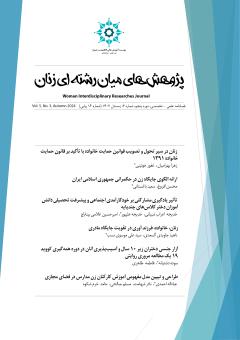طراحی و تبیین مدل مفهومی آموزش کارکنان زن مدارس در فضای مجازی
محورهای موضوعی :عباداله احمدی 1 , نادر شهامت 2 , مسلم صالحی 3 , حامد خرم شکوه 4
1 - واحد مرودشت، دانشگاه آزاد اسلامی، مرودشت، ایران.
2 - واحد مرودشت، دانشگاه آزاد اسلامی، مرودشت، ایران.
3 - واحد مرودشت، دانشگاه آزاد اسلامی، مرودشت، ایران.
4 - واحد مرودشت، دانشگاه آزاد اسلامی، مرودشت، ایران.
کلید واژه: آموزش کارکنان زن مدارس, فضای مجازی, روش داده بنیاد.,
چکیده مقاله :
در دنیایی که در آن ارتباطات آنلاین به یکی از محورهای اصلی تبادل اطلاعات و دانش تبدیل شده است، انتقال مداوم و بهروز دانش به کارکنان زن آموزشی از اهمیت بالایی برخوردار است؛ اما با توجه به چالشهای فراوانی که در مسیر آموزش مجازی و آنلاین وجود دارد، نیاز به راهبردها و الگوهایی جامع و اثربخش احساس میشود. به همین دلیل یک مدل جدید و نوآورانه از آموزش در دوران فعلی پایگاههای آموزشی طراحی شد. در مرحله کیفی از بین استراتژیهای پژوهش کیفی از نظريه داده بنیاد استفاده گردید و به تدوين مدلي جامع كه شامل عوامل علي، عوامل مداخلهگر، عوامل زمینهای، راهبردهای مدل مفهومی آموزش کارکنان زن مدارس در فضای مجازی است، پرداخته شد. مصاحبه عميق بهعنوان اصلیترین ابزار جمعآوری دادهها در این مرحله مورد استفاده قرار گرفت. بر اساس نتایج بهدستآمده درمجموع 143 مفهوم و 21 مقوله یا کد باز شناسایی و استخراج و در 6 دسته اصلی داده بنیاد قرار گرفتند. بر اساس نتایج روش کیفیّ پرسشنامهای بر اساس مدل استخراج شده تدوین و در اختیار معلمان زن قرار داده شد. با توجه به نتایج برآورد معادلات ساختاری دادههای پرسشنامه، روابط علی با بار عاملی 435/0 و آماره تی 624/9 تأثیر مستقیم و معنیداری بر مقوله اصلی دارد. مقوله اصلی با بار عاملی 471/0 و آماره تی 734/7 تأثیر مستقیم و معنیداری بر راهبردها دارد. راهبردها با بار عاملی 512/0 بر پیامدها تأثیرگذارند. شرایط مداخلهگر بر پیامدها با بار عاملی 491/0 تأثیر مستقیم و معنیدار دارد. درنهایت شرایط بستر با بار عامل 529/0 تأثیر مستقیمی بر پیامدها دارد. درنهایت اعتبار مدل از نظر آماری مورد تائید قرار گرفت.
Considering the numerous challenges in online education, this research aims to compile and design a new and innovative model of virtual education. In the qualitative phase, among the qualitative research strategies, the grounded theory was used to develop a comprehensive model that includes causal factors, intervening factors, contextual factors, and conceptual model strategies for training female school employees in virtual space. Interviews were used as the primary data collection tool. Based on the obtained results, a total of 143 concepts and 21 categories or open codes were identified and extracted. The 21 identified categories were placed in the 6 main grounded data categories. Based on the results of the qualitative method, a questionnaire based on the extracted model was compiled and provided to female teachers. According to the results of the structural equation modeling of the questionnaire data, causal relationships with a factor loading of 0.435 and a T-statistic of 9.624 have a direct and significant effect on the main category. Therefore, causal conditions have a positive and significant effect on the main category. The main category, with a factor loading of 0.471 and a T-statistic of 7.734, has a direct and significant effect on strategies. The main category positively and significantly affects strategies. Strategies, with a factor loading of 0.512, affect the outcomes. Strategies have a positive and significant impact on outcomes. Intervening conditions have a direct and significant effect on the outcomes with a factor loading of 0.491. Therefore, intervening conditions positively and significantly affect the strategy. Finally, the contextual conditions, with a factor loading of 0.529, have a direct effect on the outcomes. Contextual conditions have a positive and significant effect on the strategy. In the end, the statistical validity of the model was confirmed.
